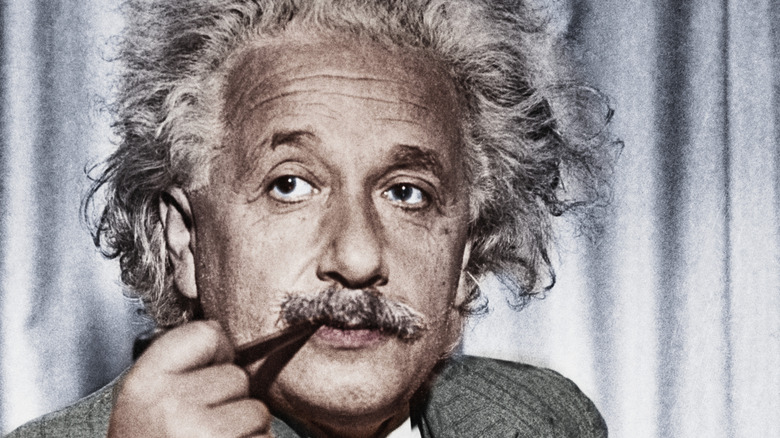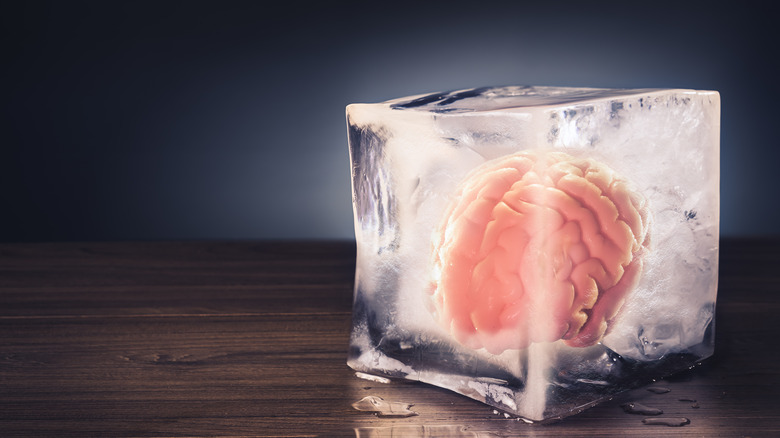This Body Part Of Albert Einstein Was Hijacked After He Died
Newton and Darwin aside, it's hard to think of a more famous scientist than Albert Einstein. Not only did he establish the theories of general relativity and mass-energy equivalence — thus paving the way for world-changing technologies like the Global Positioning System and nuclear power — everything about him has come to define what a "scientist" looks like in the public mind. (Need to instantly communicate to viewers that your character is a genius? Give the guy white, unkempt hair, a chalk-dust-covered sweater and a German accent.)
In other words, by any reasonable measure, Einstein was the first, and still the biggest, "celebrity scientist" — someone famous for being a genius, even among people who have no idea what his contributions to scientific knowledge actually were. This wasn't a role Einstein ever wanted or sought out, but when your work almost single-handedly wins the biggest war in history for the "good guys," maybe it's a little bit inevitable.
And maybe that's why, when he finally passed away in 1955, Thomas Harvey, the pathologist on call at Princeton Hospital, stole his "genius" brain, chopped it up into pieces, and took it on a wacky, 40-year road trip across the country.
They saved Einstein's brain
Einstein's instructions for what was to be done with his body after his death were pretty clear: He wanted no autopsy, and he wanted his remains cremated and scattered in secret to hide them from any potential "idolaters" (via National Geographic). That is not what happened, however. After Einstein passed away from an aneurysm at the age of 76, Thomas Harvey squirreled away not only the brain but also Einstein's eyeballs (which he gave to Einstein's ophthalmologist, Henry Abrams, and which reportedly are still sitting in a safe deposit box somewhere in New York City).
Einstein's family was understandably distressed to learn his wishes had been so flagrantly ignored, but Harvey eventually managed to extract retroactive permission from his son Hans Albert by promising that the brain would only be used, nebulously, "for science." Understandably, though, his actions got him fired from his position at Princeton.
Harvey managed to pick up a gig at the Hospital of the University of Pennsylvania, where he chopped the brain into 240 pieces, all of which were preserved in celloidin and stored in two jars of formaldehyde (via India Today). His plan from there was to ship the pieces to scientists around the country, so they could unlock the secrets of Einstein's genius (or ... something), but Harvey struggled to find any takers.
They took Einstein's brain on a road trip
With nothing left for him on the East Coast, Harvey journeyed to Wichita, Kansas, where he took a job as a supervisor in a biological testing lab and stashed the slices of brain underneath a beer cooler. When things didn't work out in Wichita, Harvey moved to Weston, Missouri, where he practiced medicine while attempting to study the brain in his spare time, until he failed a competency exam and was forced to relocate once again.
In Lawrence, Kansas, Harvey would at a plastics extrusion factory while spending much of his spare time hanging out with his new neighbor, "Naked Lunch" author William S. Burroughs (yes, really), who apparently got a kick out of bragging to friends that he could get a slice of Einstein whenever he wanted (via National Geographic).
Eventually, Harvey and a handful of collaborators did publish a few studies on the brain, but they're generally considered to be of no real scientific value (via NPR). Finally, he recruited journalist Michael Paterniti to complete his coast-to-coast road trip with him (via Harper's Magazine) The two drove to California, where Harvey tried to give the brain back to Einstein's granddaughter (via NPR). She wouldn't take it, though, so Harvey returned the brain to Princeton Hospital, which is where he passed away in 2007 (via NJ.com). As far as we know, Harvey took his own brain to the grave with him.


